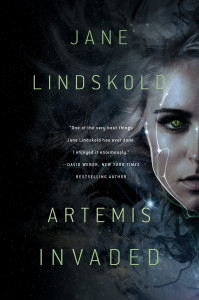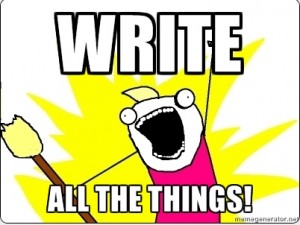
Who farted?
So… I figure maybe you’ve noticed there’s shit going down in the SF community.
(I feel this statement will be true whether this blog article finds you this week, or next week, or in October, or the weekend of World Fantasy, or on my mother’s birthday. If you want links, ask me. I generally know what’s up.)
Shit, as we know, comes from assholes. But let’s save the sphincter talk for another day. This, my dear friends, is about Us.
We SF/F/H writers are a diverse, talented, beautiful, savvy, well-informed brainalicious hive of stunningly–omg so stunningly–hardworking artists. We labor to churn out novels and stories and poems and jokes and reviews and how-to-write essays for our newest worker bee friends. We donate money we barely have to Kickstart fantastic projects because holy shit, we have to read that book! We Patreonize other stuff. We help each other when we need our DNA sequenced, our roofs patched, our cats vetted, our teeth pulled. We communicate, and we do it better than 90% of everyone. And when justified snarking is called for, in service of truth, justice and the ongoing fight against malignant retrograde thuggery, some of us snark so well! So hilariously and passionately that even though it brings the rest of us flocking ringside to fights we’d rather not witness, the sheer virtuosity of the LOLs make those essays a weird pleasure to read… even as they call down people whose staggering hypocrisy gives us all the runs.
Battles, I feel, aren’t just about the barbwire and the trenches. They’re not just lobbing the poop shells back at the other guys. I appreciate the shell-lobbers. Thank you, thank you, from the bottom of my heart.
Another thing fights are about is morale. And I saw some cries of despair on the Internet this week that made me think that ours may be starting to stink.
I’d like to think there’s an alternate universe somewhere where Chuck Wendig got to spend a morsel of his time and wit and considerable talent this week on a hilarious, profane, cunningly crafted essay about how Saladin Ahmed’s first book should be read aloud at Boy Scout campouts. And in that alternate universe, the thing gets crazy-wide play and thousands of shares. I think we owe it to ourselves to, some fine year, take turns emulating John Scalzi’s Thanksgiving Advent project until it’s a total fucking meme. I want to live in a world where our hilarious giants of the blogosphere don’t have to spent quite so much time looking up the stats and quotes that prove some tiresome dude’s specious homophobic allegations about this person or that one are not only wrong, but ridiculously, mind-bogglingly, allergic-to-logic much? wrong. I want someone to make me laugh until the tears run while saying something unexpected and improbable about how awesome the last SFWA business meeting was and they can’t wait for the next one.
There’s a deep-set cynical part of me that absolutely hates any kind of talk that smacks of what (my interior monologue always wants to assure me) is namby-pamby peace and love positive thinking malarkey. I am not really a here’s my other cheek, go ahead and smack it if you wanna kind of woman. Definitely not why can’t we all just get along? guy. But people, we are a cool fucking community and love–unlike mortgages or even Netflix–is free. I think we could do worse, in terms of upping our game, than writing each other some overt unabashed public goddamn love letters. To claim back a little of the time and energy and attention that’s being devoured, vampirically and with malice, from our pool of creative energy. To shower it on the laudable, the brilliant, the fer the love of YouPickTheDeity deserving. To be about us, if only to remind ourselves that whatever else happens, we’re creatures too fine to let ourselves get sucked down to the bitter hater marrow.
So: Hey, man, I love you guys. Like, ummm… Happy fiftieth, all of SFWA! I OMG hearts and ponies love so much about you. For starters, not a week goes by that I don’t send some student of mine to Writer Beware to keep their ass from getting handed to them by scammers.
I love Susan Palwick for spinning her own wool and praying with sick people when she’s not writing books I love. I love Nicola Griffith and Kelly Eskridge for their lifelong crazy love of music and the Eighties Dance they’ve lobbied for at the upcoming Readercon… when they’re not writing books I love. I love Peter Watts for being hilarious and brainy and questioning every idea I have so closely that every magic system I come up with sounds–after he interrogates it–like it could be quantum physics if only he was writing my stuff instead of me. I love Nalo Hopkinson for making weird lovely dolls and dresses and nurturing new talent. Sarah Chorn, I love the conversation about disability in SF that you’ve brought into the party. I love David Gerrold for trudging the mucky path to the upcoming Hugo Ceremony with dignity and commonsense and even flashes of humor. Thank you, David! I love Pat Cadigan for soliciting hand-crocheted are-you-kidding-me snake hats while she’s doing chemo. I love Michael Bishop for being a superlatively humane human being. I love the writers who created and run the Book View Cafe and Kristine Smith for sharing recipes that make me drool and Gemma Files for knowing every goddamned thing about movies ever. My sippy cup runneth over. I could go on and on and on. We blow my mind.
After each of the above call-outs, please do add the phrase, “… and also being a kick-ass writer.” Because every one of these things–every one of these people and their fiction too–deserves it own standalone essay. I could do a whole separate list just about the books and characters I want to thank so many of you for creating. And another separate list about the amazing editors and publishers who publish our words and make us look even smarter than we are and hire kick-ass illustrators to dress them for the party. There could be a whole other other list for Locus and Clarion and Turkey City and the Science Fiction Museum … well, you get the idea, right?
I will mail a copy of my most recent hardcover, signed in pink Sharpie with a big goddamned heart on it and my sincerest thanks, to the first three people to write one of these love letters. (And to then tell me about it, and send me their address). Maybe you don’t want my recent hardcover; maybe you’d rather have one of my killer story critiques or an ship or island on Stormwrack named after your dog, or an only-available-in-Canada copy of the Bond anthology coming out in November. Maybe you’d rather whatever it was got signed in teal Sharpie. All your Sharpie colors are belong to me. We can talk, is what I’m saying.
I am offering this blatant open challenge cum bribe to you all: now and then, let’s use our time and talent to create and something, here in our lovely shared fictional palace, that splatters the Internet with that same happy we’re all getting from the baby sloth videos we’re turning to, in desperation, after a hard day on the Facebooknets has plunged us into a pit of misanthropy. Let’s give each other the hit of dopamine now and then. We probably won’t use up the Internet’s supply of kitten pics anytime soon, but why take chances?
Fighting the shitzkrieg is non-negotiable. Frontline fighters, I salute and love you! But if we can’t all occasionally jitterbug madly, with a bottle of hootch and the best band we can scrape together on any given moment’s notice… well, I fear that way lies a lot more rubble and far less magical city.
 Hurrah! Setsu Uzume and Jamie Mason both took up the challenge of yesterday’s post about fantastic people in the SF/F/H community. And over on Facebook, Juliette Wade very sensibly pointed out that this love thing needs a hashtag.
Hurrah! Setsu Uzume and Jamie Mason both took up the challenge of yesterday’s post about fantastic people in the SF/F/H community. And over on Facebook, Juliette Wade very sensibly pointed out that this love thing needs a hashtag.. And one lucky remaining player can claim the third. (After that, if this thing seems to have legs, maybe there’s some chance of soliciting prizebribes from other participants.) But bribes aside, thank you. Just reading your lovely words to Nick Mamatas and Marguerite Reed and Maryann Mohanraj and Eric Flint and so many more–the pure unadulterated affection of it gave my soul a toasty glow.
. I have been writing final critiques for Novel Writing III, to the tune of 11,000 words of “Here’s what I like, and here’s what you can do better.” I dictate critiques; as I’m having my entire head frozen tomorrow so my dentist can patch one of my teeth, I figured the better part of valor was to finish today. But I’m punchy. I need to walk away from the computer and do something else. I’ve heard NPR has an awesome true crime podcast. Let’s see, shall we?





